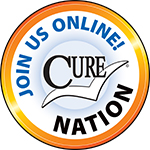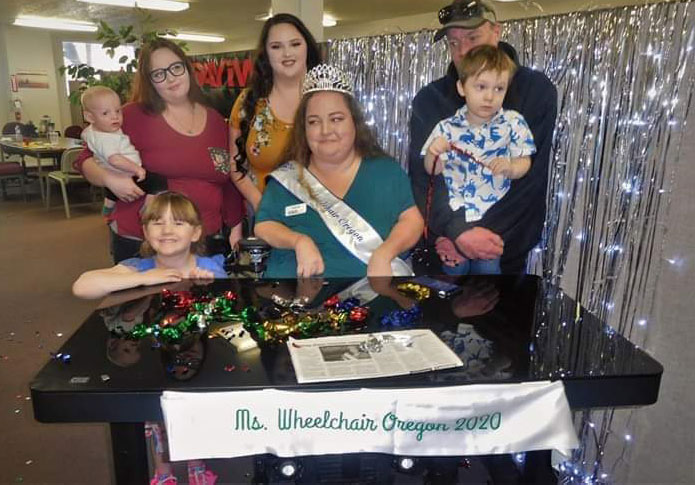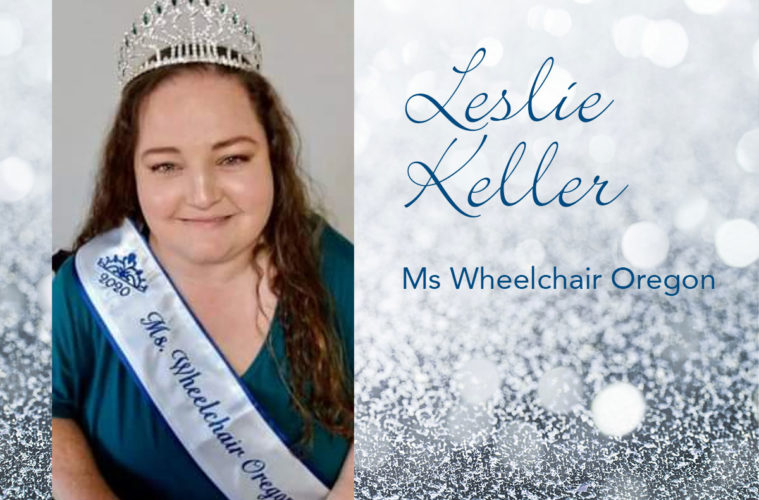 According to her mother, when Leslie Keller was born, the doctor said that Leslie would “never do anything”. Contrary to giving up hope, Leslie’s mother responded that she “…would wait and see what happened.”
According to her mother, when Leslie Keller was born, the doctor said that Leslie would “never do anything”. Contrary to giving up hope, Leslie’s mother responded that she “…would wait and see what happened.”
What ‘happened’ was Leslie Keller, the reigning Ms. Wheelchair Oregon!
As a near-DOA baby who endured 22 surgeries before the age of 15, it is in Leslie’s nature to keep going, keep battling – and keep achieving victories along the way.
Growing up, those 22 surgeries made Leslie stronger (and, a bit of a rebel). She earned her GED in difficult circumstances in her youth and as an adult, she experienced inequality in the workplace with limited options for someone in a wheelchair.
Following her mother’s lead, Leslie married at age 18. I love ‘how-we-met’ stories, so I ask about it. As she recounts meeting the man that became her husband, her tone lightens. Leslie settles in to the much-loved tale.
“I went to see my aunt who, at the time, was dating my husband’s brother. He tried to come in, but he fell right through the door! In spite of the rather clumsy first impression, it was one of those instant connection type things. We talked all night. What drew me to him is that he was looking at my face, not my braces. I had never had anybody look at me that way before. He saw me for me, instead of my disability. To this day, I am not defined by my disability in my home.”
“My father said our marriage wouldn’t last 6 months.” Leslie laughs. “We’ve been married 26 years! Helpful tip: a good marriage is all about good communication.”

Leslie Keller and her family
Those 26 years included significant challenges that ultimately led to homeless while hunting for jobs and while Leslie was just finishing college. “We just knew we had to keep going. There was no other option! Without our own place to live, I had to find motels that allowed animals. It wasn’t easy but when we face obstacles like that – it is when we grow stronger.”
Helping children understand
As Ms. Wheelchair Oregon, Leslie is working with children to help them understand differently abled individuals so that ‘disability’ isn’t a defining term for anyone.
“It all started by observing my two children. If you can get children to accept something when they are young, it sets up a basis from everything they learn going forward. My children grew up with me, so they see things in a whole different way from their friends, who may have never seen anyone who wasn’t exactly like they are.”
In the work force
“My ‘Aha Moment’ was when I was actually hired at a really good job. I had applied for it a year before. The position was given to someone else initially but apparently that person was not a good fit. When the job was offered to me, it made me realize that going to school was worth it and that, as a result, it possible for me to have a job where I went to an office, had business cards, and all that.
Previously, Leslie had always worked in retail at minimum wage. Regarding the job, she says “It gave me confidence. It helped me know that I’m worth something and can have the job I really wanted.”
Advocating for change
“One day, my boss got an email about the Miss Wheelchair pageant and said – you gotta do this! I knew that the pageant was way outside of my comfort zone, nonetheless, I said sure, let’s go for it. I had to write an essay and I chose as my platform an issue that has really impacted me greatly. You could call my platform ‘Why Can’t we Reach the Darn Crosswalk Button?!’”
It was motivated by personal experience. When trying to cross the street in Grant’s Pass, Oregon, “I got stuck in the middle,” remembers Leslie with an audible frown. She didn’t have time to go the entire width of the street because the crosswalk button was out of reach. “How am I supposed to safely cross the street if the ‘darn button’ is out of your reach?” Now, Leslie reports, “I did get the city to change four of them. I’ve been a presence here for fifteen years. They all know me.”
That’s a big change from when Leslie was growing up. Soberly, Leslie looks back and tries to make sense of it all. “I have days where I’m very upset that I have a disability. There’s no cause, it’s very unfair, but I’d be unhappy all the time if I stayed that way. It’s a lot of self-talk, remembering to be positive, just to get through it.”
It is clear that she sometimes felt alone – which is ironic because so many other people who are different feel that way too. “When I was a kid, I didn’t know anyone like me. It’s just crazy that I’ve gone through my whole life thinking I’m all alone in world. The pageant, though out of character for Leslie, has been a big help to her.
“There’s definitely a sisterhood in this pageant. We lift each other up. And I never had a sister, so this is great for me. I used to be that woman who didn’t quite click with females. If I’d had a support group like this growing up, I think things would have been different.”
As Leslie draws near to the end of her reign, I ask what she will do to round out this unusual year.
“For the rest of my reign I want more changes in my community. Those crossing light buttons are just a start! I want to keep that momentum going. I also want to be involved with my grandchildren because then, by default, I’m active in other kids’ lives. If I can get my message across to children about people in wheelchairs, I will be making a positive difference.
About Cure Medical
I told her about how Cure Medical was founded with the commitment to donate towards finding a cure for paralysis. She said “I read something about that, where Cure Medical gives back. I think more companies should do that. That’s how it should be in our world!
In summary, I’m grateful for what I have for sure. I worked hard to get life where it is, but with my husband’s support, I accomplished my goal. I believe that if I can – others can too.”
You may also enjoy:


